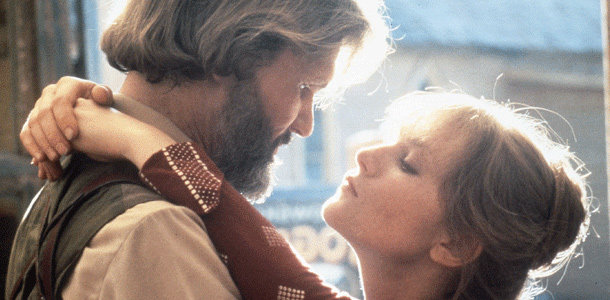Film Festivals
Passion, Amour, Heaven’s Gate: 2012 NYFF Recap
This year’s 50th anniversary edition of the New York Film Festival conserved many of the signature tenets that have earned it a prestigious reputation, while also continuing its recent (and at times unfortunate) marketing-driven expansion into mainstream territory. A provocative, eclectic selection of American and international movies — some from auteurs, some unheralded — accompanied choice restorations of classics, as well as star-driven, often sub-par fare meant to raise the festival’s industry profile with premieres and red carpet events. With the defining tenure of programming director Richard Pena now over, will the festival be able to adequately replace his discriminating, often daring taste? Will it even try? Here’s some of the high & low points of this year’s edition – you can also read my “Gala Tribute” selection reviews for: ‘Life of Pi,’ ‘Not Fade Away,’ and ‘Flight’.
Heaven’s Gate:
New York Film Festival ’12 advertisements to the contrary, it was not Michael Cimino’s visionary Western masterpiece ‘Heaven’s Gate’ (1980) which recently screened as part of the NYFF 50th anniversary “Masterworks” series at the Walter Reade theater. In what threatens to be the defining bait-and-switch M.O. for film repertory in the near future, the paying audience (with the director and star Kris Kristofferson in attendance) was instead subjected to a DCP (digital cinema package) re-creation of the movie, which in this case amounted to a low-grade bootleg DVD facsimile of the original. Cimino’s tender, violent, miraculous, ghost-like reverie (based on a true story of Wyoming cattle wars in 1870) no longer exists, except in the memory of those who were fortunate enough to have seen 35MM prints.
Even an infinitely degraded film print, one so decayed that it merely flashes incoherent sepia shadows on a screen, would have a closer relationship to the original movie than the pixilated mess the Criterion Collection is passing off as an official restoration. But will Criterion’s teflon “brand” keep it immune from criticism?
The worst part is that Cimino himself is a co-conspirator. Whatever cosmetic remastering he has inflicted on his own self, he unfortunately seems to have also inflicted onto his great masterwork. It was inexplicably Cimino, and not legendary cinematographer Vilmos Zsigmond (‘McCabe and Mrs. Miller,’ ‘Obsession,’), who oversaw the digital restoration. Many changes, including digitized color “enhancements” (greens and blues are obviously “touched up”) are an insult to Zsigmond’s mastery — as if his in-camera photography, one of the most spellbindingly beautiful achievements in all of American film art, were somehow lacking or incomplete. Zsigmond’s de-saturated exteriors (partly the result of his signature pre-exposure of film stock) have not been enhanced, but criminally bowdlerized, and all with a few casual clicks on some software’s color wheel filter.
Still, no matter how defaced it is, the beauty of this unparalleled movie still shines through. There’s Cimino’s tumultuous, hypnotic circling; his long, lingering close-ups (like John Cassavetes with Gena Rowlands, Cimino captures the momentaneous shifts of emotion and thought murmuring under the surface of Isabelle Huppert’s face). They can beat its body and cripple it, but the movie’s soul is immortal.
Passion:
The most fully realized, purely entertaining main slate movie at NYFF ‘12. A lifetime of dealing with actress pathologies has informed Brian DePalma’s suspense-driven tale of three scheming, vulnerable, sexy, sex-obsessed women working in the ad industry — and yet this is a movie all about being in love, and the endlessly magnifying pain of not being loved back. Layered, tricky performances from both Rachel McAdams and Noomi Rapace. Refreshing mockery of today’s advertising-driven culture, from the ingenious satire of the “ass-cam” (rivaling the triple-martini cookie that saves Rock Hudson’s job in ‘Lover Come Back’), to the absurdity of short-term internet trends: “Your video got 10 million hits in 5 hours!” someone’s lackey splutters. Split screens, dreams within dreams, and spiral staircases reflecting the warped minds of killers and victims alike: What greater pleasure is there than watching a Brian DePalma movie?
Amour:
A high-art snuff film. The title is a snide provocation (unlike DePalma’s apt and earned ‘Passion’); a better one would be “Worst Case Scenario.” Haneke is just one more self-castrating male European (at least Lars von Trier still has his sense of humor); his movie amounts to an expression of hostility towards his characters, himself, the audience, and filmmaking in general. The actors are the highlight; they are fine, committed, touching. But Haneke insists on looking at them only as lab mice in a cage. A scare sequence that would not be out of place in ‘The Grudge 4’ will instead be sold as “Bergman-esque” to audiences willing to buy Haneke’s art-film pretense. Haneke is essentially making a conventional dread-spread horror movie (maybe the best title would be ‘Final Destination 6’), but uses narrative ellipses, reality/fantasy confusions, and characters who play highbrow classical music for a living to persuade the audience that something more profound is happening. Don’t buy it.
Something in the Air:
Rarely will you see a movie based on a filmmaker’s personal past so lacking the quality of lived-in experience. Olivier Assayas is an insightful observer of film history, and he has good taste in movies, music, and actresses. But his major fault as a director is that he cares too much about what people think. When you do that, you become calculating, instead of instinctive. Assayas wants to be liked; in ‘Something,’ he hijacks his own personal experience as a teenager in France during the turmoil of the late ‘60s to create a fabricated objet-d’art targeted towards what he perceives to be today’s younger generation of faddish ‘Occupy Wall Street’ enthusiasts. But while forced to watch the vapid, self-important hippies that wander through Assayas’ movie, one can’t help but empathize with Robert Bresson, belatedly grieving for the fallen world he had to suffer in while making his masterpiece ‘The Devil, Probably.’ ‘Something’ makes several designed references to Assayas’ earlier work, the masterpiece ‘Cold Water.’ But these reminders only set in high relief the difference between his former resonant instincts, and his current over-thinking.
Like Someone In Love:
Abbas Kiarostami’s movie about an elderly professor’s encounters with a young prostitute in Tokyo has some exquisite sections, including a poignant taxi ride sequence worthy of Ozu. The second half loses some focus; the final set-up involving the professor’s ivory tower apartment besieged by outside assault reflects Kiarostami’s signature theme of openings vs. closures, but feels over-orchestrated.
Holy Motors:
Carax = Cinema. He takes the most common movie staples — the sex scene (here re-invented via motion capture for the 21st century), the male hero returning home to the wife and kids after the movie’s wild adventures — and makes his own unforgettable variations. But as exhilarating and unpredictable as ‘Holy’ is, it’s just the movie a great director makes when he isn’t able to make the movie he really wants to make. There should be a holy law chiseled on tablets that Carax can make whatever he wants, no matter the cost (he once said, with no hint of irony, that his dream project about an astronaut romance on the moon fell through because “the location was too expensive”). The internet-driven hype machine that has embraced the talking point of ‘Holy Motors’ being a “re-birth of cinema” reflects a trend-obsessed, short-term memory culture that did not exist in 1999, when Carax’s last feature played at the NYFF. But ‘Pola X’ (a modern adaptation of Herman Melville’s ‘Pierre’) felt like a re-birth at the time … or more precisely, like what cinema always was, or was meant to be. Every Leos Carax movie feels like a re-birth; that is his rare genius. But there’s something flighty and inconstant about the media embrace of this new movie, as if it were all about media self-congratulation, critics and bloggers and marketers reassuring themselves that if the movies are still relevant, then so are they. The reaction doesn’t suit Carax, an old-fashioned tortured Romantic who only really makes sense when the world doesn’t understand him at all.
Lincoln:
Spielberg effectively channels John Ford in this stirring portrait of Abraham Lincoln (Daniel Day-Lewis) in the last month of his life as he battles against the odds to pass the thirteenth amendment outlawing slavery. Screenwriter Tony Kushner and Spielberg (who collaborated on the excellent ‘Munich’) don’t attempt revisionist biography of the legend: Day-Lewis’ Lincoln is never less than an icon, a ghostly presence haunting mortal human affairs. Kushner’s eloquent, weighty dialogue puts to shame the poseur verbosity of someone like Aaron Sorkin. It’s an odd choice on the part of Kushner and Spielberg to hitch the narrative so exclusively to the practical political maneuverings (unashamedly utilizing the conventional “we’re X number of votes from getting it passed” plot device) leading up to the amendment’s passing. But it works on an emotional level because it is so evidently anchored by the elemental conflict between human freedom and bondage. There are missteps along the way (the worst moment is a cringe-worthy reveal involving Tommy Lee Jones’ hard-line abolitionist), but in the end ‘Lincoln’ is a deeply satisfying modern myth story.
Frances Ha:
Not nearly as funny, witty, or charming as you hope it will be. Noah Baumbach embarrasses himself by so unapologetically pandering to the hipster crowd. Greta Gerwig was brilliant in Whit Stillman’s ‘Damsels in Distress,’ making a deceptively difficult role seem natural and self-evident. It’s hard to imagine any other actress being able to pull off eccentric “Violet”; as “Frances,” she settles too often for quirky mannerisms. Skip ‘Frances’ and rent ‘Damsels,’ a truly great American comedy.
Leviathan:
This documentary about North Atlantic commercial fisherman goes admirably far towards suggesting a new cinematic grammar; there are images here you’ve never seen before, collapsing multiple visual planes (horizontal, vertical, foreground, background) into one, a hallucinatory collage, completely experiential. And yet somehow the movie fails to express much, or engage the audience on any level beyond technical appreciation. Starting with its wholly misplaced title, the culprit may be the filmmakers’ overly intellectual approach. They’re too worried about what their half-imagined academic overlords will think; for better or worse, this is one more in a long line of movies made about the working class that the working class will have little interest in watching.
Fellini’s Satyricon:
Towering far above anything old or new that screened at the NYFF was a restored 35MM print of Fellini’s divine vision ‘Satyricon,’ a profligate masterwork in that it clearly inseminated Pasolini, who after a period of gestation, produced another of the great works of modern man, ‘Salo, or 120 Days of Sodom.’ This new print proves definitively that the jerk from Columbia on line behind Woody Allen in ‘Annie Hall’ really does deserve a sock filled with horse manure. A portrait of love, innocence and hope forced to wander through the spiritual desert of a world gone mad. Despite trendy contemporary claims about cinema’s re-birth, Fellini’s masterpiece is still ahead of our time.




























